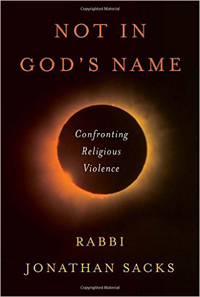 Rabbi Jonathan Sacks, Not in God's Name; Confronting Religious Violence (New York: Schocken Books, 2015), 305pp.
Rabbi Jonathan Sacks, Not in God's Name; Confronting Religious Violence (New York: Schocken Books, 2015), 305pp.
Think about it — the first religious act by the first children of Adam and Eve led directly to the first murder. Cain and Abel offered their sacrifices to God. When God rejected the former's gift and accepted the latter's, we read that "Cain was very angry." Despite God's efforts to calm him down, "Cain attacked his brother Abel and killed him."
This on page five of my Bible, a book whose purpose is to commend religion! God's verdict about Cain's act of sacred violence is as true today as it was back then: "Your brother's blood cries out to me from the ground." A few pages later, God wept over the breadth and depth of our human violence (Genesis 6:6). Yes, the story says, we are our brother's keeper.
Following the work of Freud and René Girard, Rabbi Jonathan Sacks locates the origins of religious violence in sibling rivalry and mimetic desire. Sibling rivalry is "the most primal form of violence," and "the dominant theme of the book of Genesis." We desire what others have, become rivals for it, and then fight to get it in what we wrongly think is a zero sum game. And so Jews, Christians and Muslims all claim to be the true heir of Abraham. We fight to be the sole inheritor of the divine promise.
The stories are familiar to those who know their Bibles, but in Sacks's "close reading" of them, he offers interpretations in which sibling rivalry is revealed and then subverted. With Isaac and Ishmael we learn that "God chooses (Isaac), but he doesn't reject (Ishmael)." The story of Jacob and Esau is "the refutation of sibling rivalry in the Bible." Recall how Jacob returned the blessing that he stole from his blind father Isaac to Esau. The story of Joseph and his brothers who tried to kill him takes up a third of the book of Genesis — in the end, the victim forgives and the perpetrators repent. Rachel and Leah exemplify the "rejection of rejection." Sibling rivalry is natural, says Sacks, but it's not inevitable.
Human beings cannot live without a group identity, and religion might be the most powerful of them all. By definition, groups require an Us and a Them. It's hard not to hear the binary words of former president George Bush: "You're either for us or against us." There's no middle ground, no subtlety or nuance, only black and white, in and out. By nature, we extend altruism toward my In group, and hostility toward my Out group.
Here again the Hebrew revelation subverts our natural inclinations by commending a radical role reversal. Do not oppress the stranger, the people outside your group. Why? Because you know what it's like to be oppressed as a stranger in a strange land (Exodus 22.21). Love your neighbor, protect the weak, care for widows and orphans, help the poor, speak up for those who have no voice. Do justice, love kindness. Don't long for power, for you can't impose faith or truth by force. For Sacks, religion is an anti-politics that lives without power. Instead, it compels by example.
Demographers tell us that people of religion will increase in the coming decades, whereas secular populations will decrease. We must reclaim our common humanity that takes precedence over our religious differences. However powerful the natural impulse, we don't have to desire what my rival has, says Sacks, because "it is for what we uniquely are that we are all loved by God." So, whereas the roots of human violence are found in religion, so too is its subversion, for the original Abrahamic promise was that "through you all the families of the earth will be blessed."


